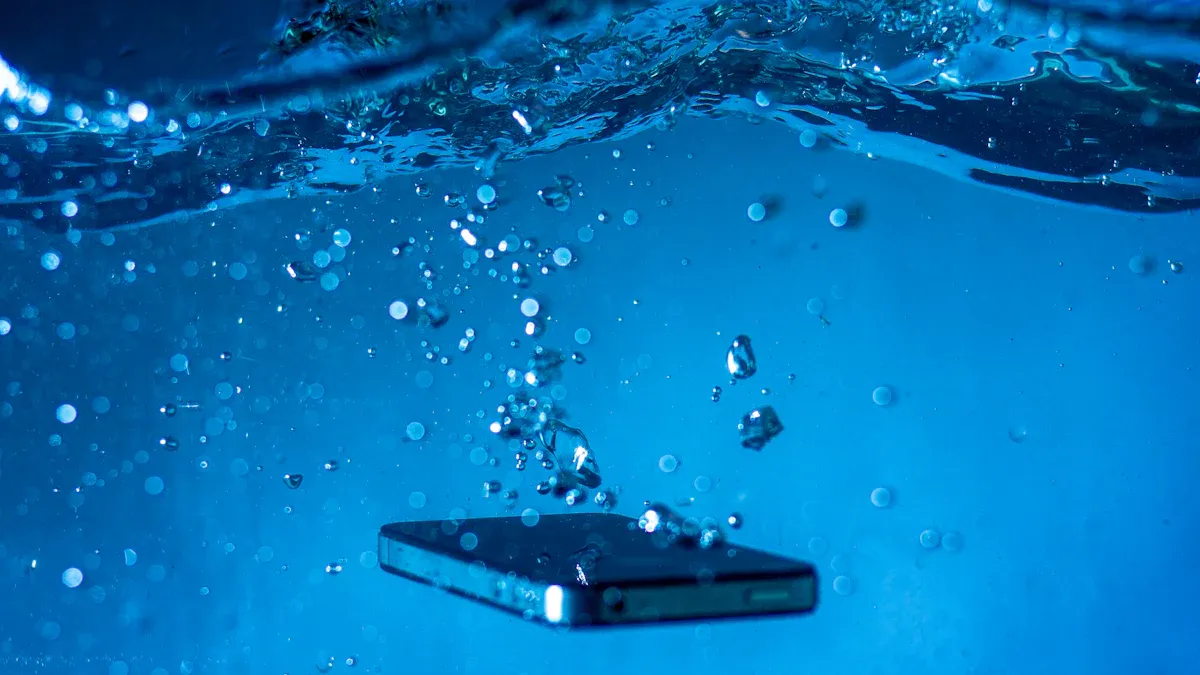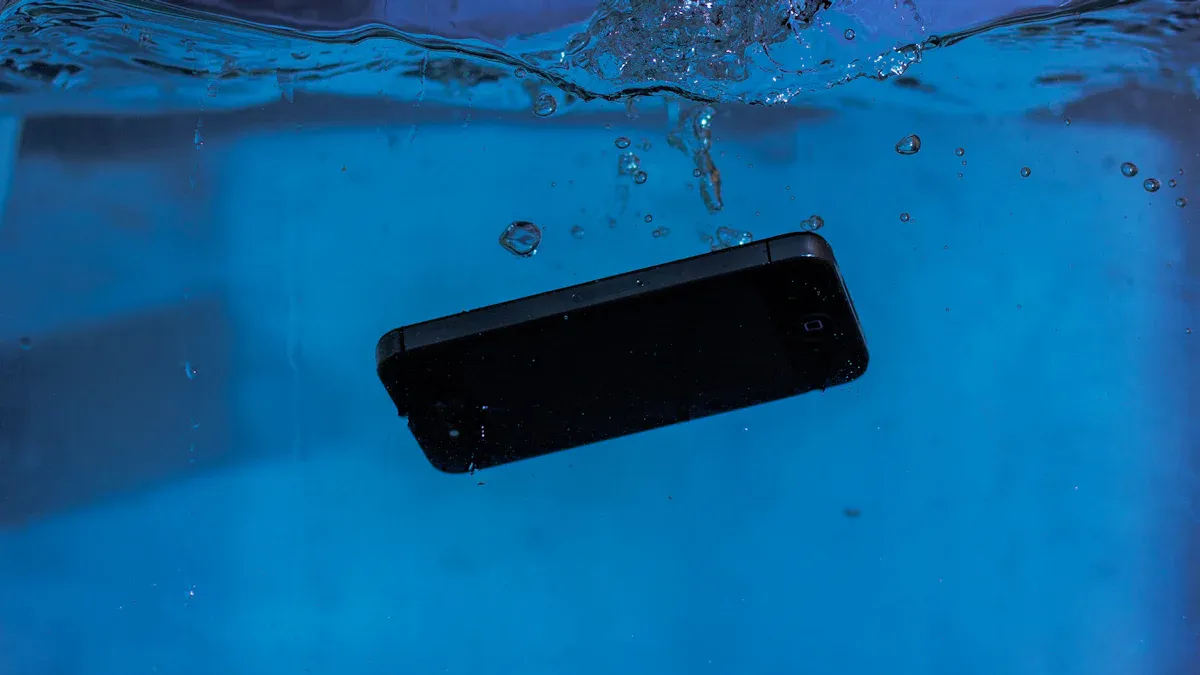
IP ratings play a critical role in evaluating the durability of Joiwo telephones. These ratings indicate how well a device resists water and dust, essential factors for longevity. Recent studies reveal that 35% of smartphone failures arise from inadequate water resistance. Thus, understanding IP ratings helps users make informed choices about their devices.
Understanding IP Ratings

Definition of IP Ratings
IP ratings, or Ingress Protection Ratings, define the protection level of electrical and mechanical enclosures against water and foreign bodies like dirt and dust. The International Electromechanical Commission (IEC) established the IP rating system to classify these degrees of protection. A complete description of the IP ratings can be found in IEC Publication 529. This publication specifies how well a device can withstand environmental conditions.
The IP rating consists of two digits. The first digit indicates solid protection, while the second digit represents liquid protection. Here are some key points about IP ratings:
- The first digit ranges from 0 to 6, indicating the level of protection against solid objects.
- The second digit ranges from 0 to 9, indicating the level of protection against water.
How IP Ratings are Measured
Measuring IP ratings involves standardized tests that assess a device’s resistance to dust and water. The following table outlines the main components that make up an IP rating code for electronic devices:
| First Digit | Solid Protection | Second Digit | Liquid Protection |
|---|---|---|---|
| 0 | No protection | 0 | No protection |
| 1 | Solid objects larger than 50mm | 1 | Dripping water |
| 2 | Solid objects larger than 12mm | 2 | Dripping water at 15° |
| 3 | Solid objects larger than 2.5mm | 3 | Spraying water |
| 4 | Solid objects larger than 1mm | 4 | Splashing water |
| 5 | Dust and other particles | 5 | Water jets |
| 6 | Full protection | 6 | Powerful water jets |
| 7 | Immersion, < 1 meter | ||
| 8 | Immersion, > 1 meter |
To quantify water resistance during IP rating assessments, the second numeral of the IP code indicates the level of water protection, ranging from 0 to 9. Testing procedures are defined in the IEC 60529 standard. For example, an IP67 rating signifies that a device can withstand immersion in water up to 1 meter for a specified duration.
Testing methods include:
| Type of Testing | Description |
|---|---|
| Dust Ingress Testing | Evaluates how well a device withstands dust exposure over time. |
| Water Resistance Testing | Assesses the device’s ability to survive water exposure, including sprays and submersion. |
| Immersion Testing | Tests the device’s capability to remain functional when fully submerged in water for a specified time. |
| Pressure & Temperature Tests | Checks the device’s performance under extreme pressure and temperature conditions. |
Understanding these ratings helps consumers choose devices that meet their specific needs, especially in challenging environments.
Joiwo’s Water-Resistance Testing

Overview of Testing Procedures
Joiwo employs a comprehensive set of procedures to ensure the water resistance of its telephones. These procedures include multiple tests designed to evaluate various aspects of durability. The following list outlines the specific tests conducted during the water-resistance evaluation:
- Salt Spray Test: This test assesses the device’s resistance to corrosion from saltwater exposure.
- Tensile Strength Test: This evaluates the strength of materials used in the device under tension.
- Electroacoustic Test: This checks the performance of audio components when exposed to moisture.
- Frequency Response Test: This measures how well the device maintains sound quality in wet conditions.
- High/Low Temperature Test: This examines the device’s performance under extreme temperature variations.
- Waterproof Test: This is a critical test that determines the device’s ability to withstand water immersion.
- Smoke Test: This ensures that the device functions correctly without any electrical failures.
Joiwo telephones undergo these tests regularly as part of their extensive quality assurance protocols. Each test plays a vital role in confirming that the devices meet high standards for water resistance.
Standards and Protocols Followed
Joiwo adheres to several international standards during its water-resistance testing. These standards ensure that the testing procedures are reliable and consistent. The following list highlights some of the key standards referenced:
- ISO 4064-2
- ISO 2678
- ISO 7137
- ISO/DIS 12346
- ISO 8995 CIE S 008
- EN 61032
- EN 50075
- EN 61010-1
- EN/BS 1363-2
- EN/BS 12464-1
- VDE 0470-1
- IEC 60335-1
- IEC 62368-1
- IEC 60598-1
- IEC 61058-1
- IEC 60669-1
- IEC 60227-1
- IEC 60670-1
- IEC 60884-1
- IEC 60529
- IEC 60238
- IEC 60950-1
- IEC 61010-1
- IEC 61032
- IEC 60809
These standards guide Joiwo in maintaining rigorous testing protocols. They ensure that the devices not only meet but exceed the minimum IP rating requirements for telephones used in hazardous or industrial environments. For instance, an IP65 rating indicates that a device is dust-tight and protected against low-pressure water jets, while an IP66 rating signifies protection against powerful water jets.
By following these established standards, Joiwo guarantees that its telephones provide reliable performance in challenging conditions, enhancing user confidence in their durability.
Significance of High IP Ratings
Real-World Applications
High IP ratings play a crucial role in various industries, particularly those that operate in extreme environments. The IP rating system indicates a device’s resistance to dust and water, which is vital for durability. Here are some key applications:
- Construction Sites: Workers often face rain, snow, and dust. Devices with high IP ratings, such as IP67, ensure functionality even when submerged in water or exposed to mud.
- Logistics and Transportation: Equipment used in these sectors must withstand harsh conditions. High IP ratings like IP65 and IP68 guarantee reliable performance, making devices indispensable.
- Military Operations: Personnel require communication devices that can endure severe weather and rugged terrains. High IP ratings provide the necessary protection against environmental hazards.
User Benefits of High IP Ratings
High IP ratings significantly enhance user safety and device longevity. They offer substantial protection against environmental hazards like dust and water. This reliability is essential for equipment used in challenging environments. A higher IP rating can also prolong the lifespan of devices by safeguarding them from common risks such as spills and dust buildup.
Moreover, consumers often expect that devices with high IP ratings will be covered under warranty for water damage. However, it is important to note that water damage typically voids standard warranties. Manufacturers often clarify that while high IP ratings indicate resistance, they do not guarantee warranty coverage for water-related issues.
Comparison with Competitors
Joiwo vs. Other Brands
Joiwo stands out in the market due to its commitment to high IP ratings. Many competitors offer devices with lower ratings, which may not withstand harsh conditions. Joiwo’s telephones often feature ratings such as IP67 or IP68, ensuring robust protection against dust and water. In contrast, other brands may only provide IP54 or IP55 ratings, limiting their usability in challenging environments.
| Brand | Typical IP Rating | Durability Features |
|---|---|---|
| Joiwo | IP67/IP68 | High water and dust resistance |
| Competitor A | IP54 | Moderate water resistance |
| Competitor B | IP55 | Basic dust protection |
Unique Selling Points of Joiwo’s IP Ratings
Joiwo’s IP ratings come with several unique selling points that enhance their appeal. First, the engineering efforts required to achieve these ratings involve advanced design modifications. This ensures that Joiwo devices not only look good but also function well under pressure.
Second, Joiwo utilizes specialized materials like gaskets and seals, which contribute to the overall durability of their products. These materials help maintain the integrity of the device, even in extreme conditions.
Moreover, the increased production costs associated with higher IP ratings allow Joiwo to market their products as premium offerings. This strategy appeals to consumers seeking reliable devices.
Finally, environmental regulations are shaping the development of high IP-rated telephones. As manufacturers face pressure to adopt sustainable practices, Joiwo remains committed to eco-friendly production methods. This dedication resonates with environmentally conscious consumers.
IP ratings significantly influence the durability of Joiwo telephones. High ratings ensure devices withstand harsh conditions, enhancing user confidence. Industry experts recommend specific ratings based on application needs:
| Industry | Recommended IP Rating | Reason for Recommendation |
|---|---|---|
| Healthcare | IP65 or higher | Ensures devices can be disinfected without risk of failure. IP67 or IP68 is needed for sterilization cycles. |
| Industrial Use | IP65 | Minimum standard to be dustproof and withstand low-pressure water jets during cleaning. |
| Food Processing | IP68 or IP69K | Required to survive high-pressure wash-downs with hot water and sanitizing chemicals. |
Making informed choices based on these ratings leads to better device performance and longevity.

